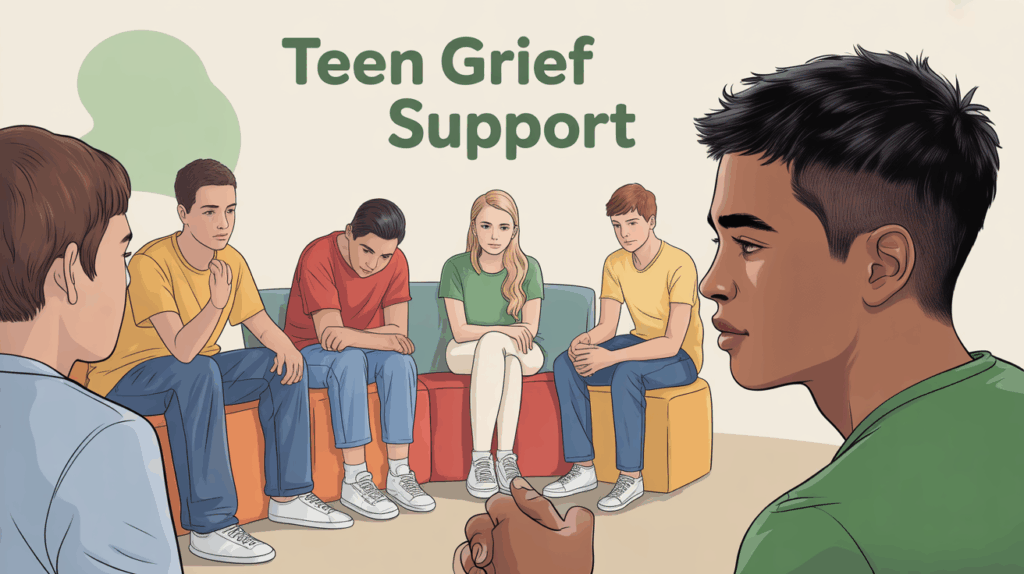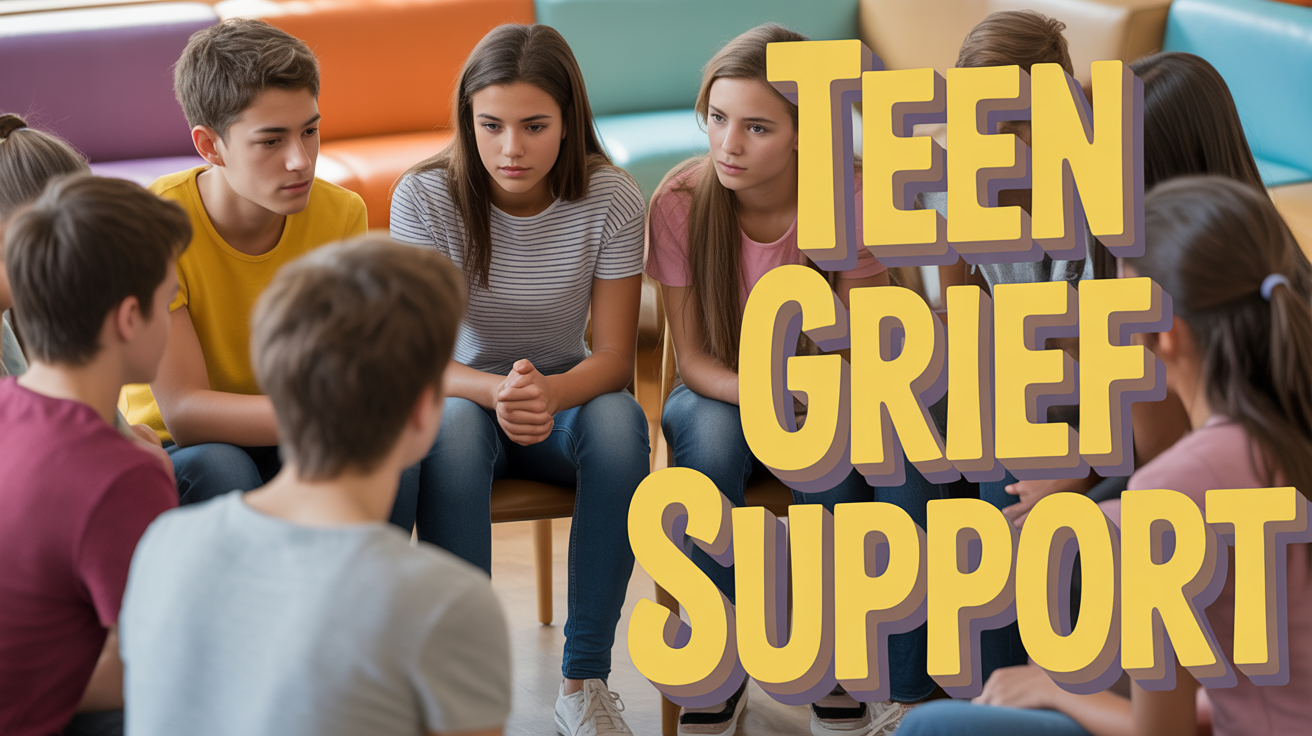Teen Grief Counseling and Support Options: How to Help Grieving Adolescents
Losing someone close during adolescence can feel overwhelming and isolating, with one in fourteen children experiencing the death of a parent or sibling by age 18. This guide on teen grief counseling and support options reveals how to recognize warning signs, explore virtual grief therapy, compare support modalities, empower parents, and tailor care for different losses—all while highlighting accessible virtual mental health programs from adolescentmentalhealth.com.
We’ll cover:
- Signs and stages of teen grief
- Benefits and process of online counseling
- Available support formats
- Parent and guardian strategies
- Tailored approaches for specific types of loss
What Are the Signs and Stages of Grief in Teenagers?
Teen grief begins as intense emotional and behavioral shifts when adolescents confront loss, driven by developmental changes and identity formation. Early recognition of these patterns enables timely support and prevention of complicated grief.
How Do Teens Experience the Five Stages of Grief?
Teens progress through denial, anger, bargaining, depression, and acceptance as they adapt to loss, each stage offering insight into their evolving coping needs:
- Denial – Refusing to accept reality cushions initial shock.
- Anger – Irritability and blame signal emerging pain.
- Bargaining – “If only…” thoughts attempt to regain control.
- Depression – Persistent sadness, withdrawal, or hopelessness.
- Acceptance – Gradual reconciliation and renewed engagement.
Understanding these stages guides caregivers to match support strategies with each phase’s emotional demands.

What Are Common Emotional and Behavioral Symptoms of Teen Grief?
Emotional and behavioral indicators of adolescent bereavement span multiple domains:
- Emotional: Intense sadness, irritability, anxiety
- Behavioral: Social withdrawal, changes in sleep or appetite
- Cognitive: Difficulty concentrating, intrusive thoughts
- Physical: Headaches, stomachaches, fatigue
These symptoms often overlap, so holistic observation helps tailor interventions and prevents mislabeling grief as purely behavioral issues.
When Should You Seek Professional Help for a Grieving Teen?
Professional grief counseling is recommended when adolescents exhibit red flags that impede healing:
- Persistent grief beyond six months
- Suicidal thoughts, self-harm, or risky behaviors
- Severe academic or social decline
- Signs of complicated grief such as intense guilt or numbness
Prompt referral to qualified therapists prevents prolonged distress and fosters healthy emotional processing.
How best to provide help to bereaved adolescents: a Delphi consensus study
This study identified consensus recommendations on how helping professionals can best support bereaved adolescents. The study emphasizes the importance of ongoing support, flexibility to meet individual needs, and acknowledging the adolescent’s agency in the process.
This research supports the article’s discussion of professional grief counseling and the benefits of tailored support for grieving teens.
How Does Virtual Grief Counseling Support Teens?
Virtual grief counseling leverages secure video sessions and digital resources to connect grieving teens with licensed therapists, improving accessibility, consistency, and developmental appropriateness from any location.
What Are the Benefits of Online Grief Therapy for Adolescents?
Online grief therapy provides flexible scheduling, specialized teen expertise, and a private setting that encourages open expression. Key advantages include:
- Accessibility: Eliminates travel barriers and reduces wait times
- Specialization: Therapists trained in adolescent development
- Convenience: Sessions from home support comfort and continuity
Effectiveness and Feasibility of Internet-Based Interventions for Grief After Bereavement: Systematic Review and Meta-analysis
Internet- or mobile-based interventions might constitute an effective treatment approach against symptoms of grief in bereaved adults. The review found that online bereavement support was feasible, acceptable and effective in reducing grief intensity, stress-related outcomes and depression.
This source supports the article’s discussion of virtual grief counseling, highlighting its effectiveness in reducing grief symptoms.
How Does Virtual Grief Counseling Work for Teens?
Virtual counseling for adolescents typically follows a clear, supportive sequence:
- Intake Assessment – Secure video intake evaluates history and needs.
- Personalized Plan – Therapist and teen set goals and coping strategies.
- Regular Sessions – Weekly video meetings combine talk therapy, creative activities, and skill-building.
- Family Check-Ins – Optional parent sessions ensure ongoing support.
- Progress Review – Periodic evaluations refine treatment as teen resilience grows.
This structured approach promotes steady emotional regulation and builds trust in the virtual format.

What Concerns Do Families Have About Virtual Therapy and How Are They Addressed?
Families commonly worry about privacy, technical issues, and therapeutic rapport in online care, but accredited platforms resolve these by:
- Using encrypted connections to ensure confidentiality
- Offering orientation sessions to familiarize users with the platform
- Training therapists in virtual engagement techniques to maintain empathy and presence
These measures reinforce confidence and deliver high-quality grief support remotely.
What Types of Grief Support Options Are Available for Teens?
Adolescents benefit from diverse support modalities—each aligning with different coping preferences and developmental needs.
| Support Option | Format | Key Benefit |
|---|---|---|
| Individual Counseling | One-on-one sessions | Personalized coping strategies and goals |
| Group Counseling | Therapist-led group | Shared experiences and peer validation |
| Online Peer Support | Moderated virtual hub | Reduced isolation through community bonding |
| Family Therapy | Multi-family sessions | Improved communication and collective healing |
These options allow families to choose the structure that best engages a grieving teen’s unique emotional needs.
How Do Individual and Group Grief Counseling Differ for Adolescents?
Individual sessions focus on private exploration of feelings and coping skills tailored to a teen’s developmental stage, while group counseling fosters peer connection and normalization through shared narratives, reducing shame and isolation.
Grief & At-Risk Behavior: A look at the effectiveness of grief counseling groups for adolescents in public schools
Grief counseling groups are effective interventions for adolescents that foster both social and emotional skills. These groups can provide an environment that promotes resilience, which acts as a protective factor against the physical, emotional, social, and cognitive grief responses of adolescents.
This source supports the article’s discussion of group counseling as a support option for teens, highlighting its benefits in developing coping skills and promoting resilience.
What Role Do Online Grief Support Groups Play for Youth?
Online peer support groups offer moderated forums where teens can connect with others who have faced similar losses, exchanging coping strategies and building social bonds that reinforce resilience and a sense of belonging.
How Can Family Therapy Help Grieving Teens?

Family therapy enhances collective healing by improving open communication, aligning expectations, and teaching caregivers how to respond sensitively to evolving adolescent grief, ultimately strengthening family cohesion.
How Can Parents and Guardians Support a Grieving Teen?
Parents and guardians can foster recovery by combining empathy, open communication, and resourceful guidance, helping teens navigate complex emotions.
How to Help Grieving Adolescents
Research indicates that the death of a caregiver or loved one is a common and distressing trauma for children and adolescents, potentially leading to serious mental and emotional issues. Caregivers can help prevent long-term grief issues by offering support, teaching healthy coping mechanisms, and creating a safe space for expression of feelings.
This source highlights the importance of caregiver support in helping adolescents cope with grief, which aligns with the article’s focus on parental and guardian strategies.
What Are Effective Ways to Talk to a Grieving Teenager?
- Listen Actively – Give full attention and validate feelings without judgment.
- Ask Open-Ended Questions – Encourage description of thoughts and memories.
- Share Coping Techniques – Model calming practices like deep breathing or journaling.
Maintaining supportive dialogue affirms that grief is a natural process and that help is available.
How Can Parents Recognize and Respond to Teen Grief Symptoms?
Recognize persistent irritability, marked withdrawal, or expression of hopelessness, and respond by offering professional referrals, adjusting household expectations, and reinforcing self-care routines.
What Resources Are Available for Parents to Help Their Teens?
Parents can access guides on developmental grief, virtual mental health program referrals at adolescentmentalhealth.com, educational webinars, and peer-led support networks to strengthen their role as effective advocates.
What Every Parent of a Grieving Teen Must Know
Teens who suffer the loss of a loved one may need more grief support than many well-meaning adults recognize. The article also mentions resources such as the National Alliance for Grieving Children and The Compassionate Friends.
This source reinforces the article’s emphasis on the need for support and resources for grieving teens, and provides examples of organizations that offer assistance.
How Do Specific Types of Loss Affect Teen Grief and Support Needs?
The nature of loss—whether a parent, sibling, friend, divorce, or pet—shapes grief intensity and the interventions required for healing.
How Does Parental or Sibling Loss Impact Adolescents Differently?
Parental or sibling death often triggers profound identity disruption and attachment grief; targeted counseling addresses shifting family roles and helps teens rebuild security and self-worth.
What Are the Effects of Peer or Friend Loss on Teenagers?
Teen grief after peer death frequently involves disenfranchised grief, as peers and adults may underestimate its depth; specialized support groups validate feelings and prevent prolonged distress.
How Is Grief From Divorce or Pet Loss Addressed in Teen Counseling?
Counseling for divorce grief focuses on navigating family restructuring and co-parenting dynamics, while pet loss therapy acknowledges attachment bonds and uses commemorative exercises to foster closure.
Grief during adolescence profoundly shapes emotional development, but with attentive recognition, evidence-based support options, and accessible virtual programs, grieving teens can learn healthy coping, restore resilience, and reconnect with hope. For personalized virtual grief counseling tailored to adolescent needs, explore the compassionate services available at adolescentmentalhealth.com.









